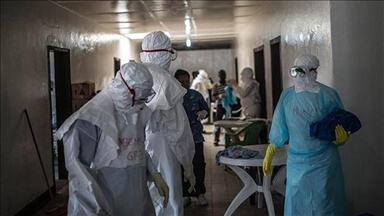|
LISTEN TO THIS THE AFRICANA VOICE ARTICLE NOW
Getting your Trinity Audio player ready...
|
Rwanda Sunday announced strict measures to control the spread of the Marburg virus after the East African nation confirmed its first outbreak of the deadly disease. The health ministry’s advisory included a cap on funeral attendance and restrictions on hospital visits, aiming to mitigate the spread of this highly contagious virus.
The Marburg virus, which is related to Ebola, is known for its devastating fatality rate of up to 88%. It originates from fruit bats and spreads through contact with bodily fluids of infected individuals. By Monday, the number of confirmed deaths from the virus in Rwanda had risen to eight, marking a serious public health challenge for the country.
The Rwandan health ministry urged the public to maintain “normal business and other activities,” but it issued stringent new guidelines on gatherings and contact. Funerals for individuals who died from Marburg were limited to a maximum of 50 attendees, reflecting concerns about the virus’s capacity to spread in close-contact settings. The ministry also advised the public to avoid close contact with anyone displaying symptoms of the virus, which include fever, headaches, muscle aches, vomiting, and diarrhea. Severe cases can result in death from massive blood loss, as the disease aggressively attacks the body.
In an effort to curb further transmission, the health ministry also announced that hospital patients would not be permitted visitors for a 14-day period, and each patient would only be allowed one caregiver at a time. This was a significant measure in a country where family members often assist in basic patient care, such as washing and feeding—tasks typically handled by nurses in other healthcare systems. These precautions sought to balance the need for patient support with the priority of preventing further infections.
On Saturday, when the death toll stood at six, Rwanda’s Health Minister revealed that most of the victims had been healthcare workers who were caring for patients in an intensive care unit.
In response to the outbreak, Rwandan authorities intensified their contact tracing efforts. By Sunday, they were monitoring approximately 300 individuals who had been in contact with known cases, underscoring the urgency of containing the virus before it could spread further within the community. The government also heightened surveillance and testing efforts, focusing on early detection to prevent more cases.
The health ministry advised the population to practice good hygiene, including frequent handwashing, as part of a broader effort to mitigate the risk of infection. Rwanda’s healthcare system, while robust in many areas, faces challenges in dealing with such outbreaks, making prevention crucial to controlling the virus.
Marburg’s appearance in Rwanda is part of a broader pattern of sporadic outbreaks across East Africa. Neighboring Tanzania experienced an outbreak in 2023, while Uganda reported cases in 2017, resulting in three deaths.











LEAVE A COMMENT
You must be logged in to post a comment.